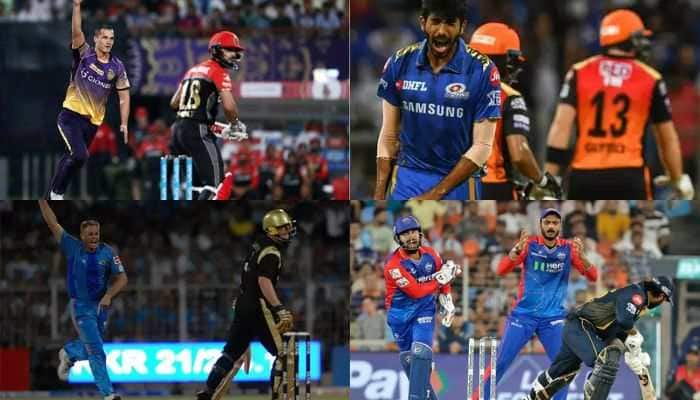Chidambaram debunks Modi govt stand on capping GST rate in statute
Know why P Chidambaram is saying Modi government GST Bill flawed....
Trending Photos
)
New Delhi: Debunking the stand that GST rate cannot be put on the statute, former Finance Minister P Chidambaram on Sunday said there is a precedent of a tax rate being put in the Constitution besides the powers government has to impose new levies in extraordinary situations.
Dismissing Finance Minister Arun Jaitley's charge that the Congress party was stalling passage of the Goods and Services Tax (GST) Bill for "collateral reasons", he said the party was ready to cooperate with the government but has not heard from it after the meeting between Prime Minister Narendra Modi and Sonia Gandhi last month.
Also Read: Even the trinity of Gods Brahma, Vishnu and Mahesh can't help meet GST deadline: Anand Sharma
"If the Government had constructively engaged with the Congress on its three principal objections since the beginning, the bill could have been passed by now," he told PTI here.
Chidambaram said Chief Economic Advisor Arvind Subramanian's report on GST endorses two out of the three demands of the Congress -- there should be no one percent additional levy on inter state goods movement and the GST rate should not be more than 18 percent.
On Jaitley's stance that the tax rate cannot be cast in stone by including in the Constitution, he said there is a precedent when Professional Tax rate of Rs 2500 was included in the Constitution.
Also Read: GST being delayed for 'collateral reasons': FM Jaitley
"There is a precedent in the Constitution where the Professional Tax rate was capped at Rs 2500. It is not unprecedented. If the Government does not provide a cap in the Constitution Amendment Bill than it must be provided in the GST Bill. No tax can be levied without specifying the rate," he said.
In case of extraordinary situations like natural calamities, the government always has powers to bring a new levy. Also, the income tax as well as customs duties are not being subsumed in the GST and they can be raised to mop up funds for special circumstances, he said.
Explaining the reasons for the Congress demand, Chidambaram said the cap has to be in the Constitution Amendment Bill so that no government can increase the rate arbitrarily.
"Our experience is that governments including the Congress government in the past have tended to increase the rates in small dozes. The GST is a regressive indirect tax and there cannot be any justification for saying it should not be put in Constitution Bill.
"Bring another tax. You have the power under Entry 97 List-1. Increase income tax, increase customs duty or impose a calamity tax," he said.
Chidambaram, in a series of tweets, agreed with Jaitley that a delayed GST bill is better than a flawed one, contending that the present bill is "flawed".
"Agree with FM @arunjaitley. A delayed GST is better than a flawed one. Present GST Bill is flawed," he said a day after Jaitley indicated at a FICCI gathering that passage of Goods and Services Bill may not be possible in the Winter session of Parliament and that a delayed bill is better than a flawed one.
Chidambaram asked the government to accept three "weighty objections of Congress so that the bill could be passed.
"Congress' three weighty objections & the bill could be passed. One per cent tax is anyway dead. Scrap the provision," he said in another tweet.
In the interview to PTI, he said, "The power to impose new tax lies with Parliament under Entry 97, List-1. As long as that power is there, in an extraordinary situation like natural calamity, you can impose a calamity tax. Why are you keen to tinker with the GST rate."
Asked about the November 28 meeting Modi had with Sonia Gandhi and former Prime Minister Manmohan Singh on the GST, he said, "All I know is that they told Dr Manmohan Singh and Mrs Gandhi that the government will come back with revised formulations. We have not seen any revised formulations. It is almost a month now."
To a query how could the ice be broken and whether Congress would accept if the rate is put in GST bill, "We must see the revised formulation of the Government on the three principal objections raised by the Congress party and there are some minor objections. We need to see how government responds to those minor objections also."
Asked whether the April 2016 deadline for roll-out of GST would have to be given a go-by, he said shot back "I dont know who imposed that deadline. To begin with it was an unrealistic deadline. Because after the Constitution Amendment Bill, every state has to pass a legislation."
To a question as to what would be the point at which the deadlock could be broken, he said, "we must see the government's response."
On Jaitley's comments that government proposals were largely on lines of what Chidambaram as finance minister had endorsed, he said "there is no such think as agreement. These are evolving positions. The BJP, particularly Gujarat and Madhya Pradesh, opposed the GST. Are they sticking to that position today. Have they not evolved?
"These are discussions which go on in the state finance minister's council and the position evolves. The bill presented by Mr (Pranab) Mukherjee (in 2006) was one stage of evolution. The bill presented by BJP government is another stage of evolution. We are discussing the BJP's bill not Mr Mukherjee's bill or any earlier draft."
On Jaitley's argument that it would be difficult to go back to Parliament and amend Constitution if the GST rate is capped in the law, he said, even to raise the rate in an ordinary law, the government has to convince one-half of the legislature.
In case of a Constitution amendment, they will have to convince two-thirds of Parliament. "What is the difference between one half of Parliament and two-third -- it is only one-sixth."
"If the Government can convince one half of Parliament to amend the rate, why does it feel it cannot convince two-third of Parliament to amend the rate? If the situation is indeed extraordinary, if one-half of Parliament can be convinced, equally two-third of Parliament can be convinced," he said.
Again rejecting government criticism that Congress was stalling passage of the GST Bill, he said the Congress had given its objections in writing one year ago. It has taken the government this long to even to come to this stage of talking to Opposition.
He said the GST legislation was stalled by BJP for several years for no reason.
"Initially, the BJP government was dismissive of our objections. They did not even give the Opposition the respect or extend the courtesy of inviting the opposition to discuss the objections.
"After waiting six months they suddenly decided to discuss the objections. Initially they took the position that all three objections were frivolous. After a few months they have come around to the position that two of the three are not frivolous and can be accepted," he said.
The Congress has demanded that there should be a cap on the GST rate and it should be part of the Constitution Bill, which Jaitley says cannot be done. The party has also demanded that the proposed additional one percent tax on inter-state movement of goods should be shelved.
"Rate cap can be provided in the bill through skillful drafting. Talk to the opposition," Chidambaram said in another
tweet.
On the other Congress objection that the bill should provide a mechanism for grievance redress, Chidambaram also tweeted that "No state is opposed to independent dispute resolution mechanism. Set it up."
Jaitley yesterday accused the Congress of delaying the long-pending GST due to "collateral reasons". Asked about it Chidambaram said he did not understand what Jaitley meant.







)
)
)
)
)
)
)
)
)
)
